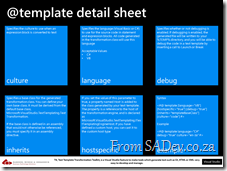DevDays South Africa 2011: My Talks
WOW! Microsoft DevDays 2011 in Cape Town & Johannesburg was fantastic, my fellow speakers rocked, the venues were brilliant and most importantly YOU, the audience was amazing!
Thank you to everyone who attended my talks, especially since they were at the end of a very tiring day. I hope I delivered value to you and if you have any questions or comments on them, please feel free to get in touch with me.
I promise the slides & demos would be made available so here they are:
Let’s get ready for the cloud: Building your applications so they are cloud ready
- Azure voucher codes so you can use Azure for free for 30 days with no credit card. Remember to select South Africa as your country.
- Cape Town: DEVDAYS11CT
- Johannesburg: DEVDAYS11JHB
- Slides (1.3Mb)
- Base for demo, this is what I started with for the demo’s (2.4Mb)
- Completed demo (2.4Mb)
- Demo script (200Kb)
Lightswitch basics: Building your first Lightswitch Application
All the files again (my blog does this)
Community Night: BE THERE
 Tomorrow is another community night, and I realised that there is MANY people who do not know about this fun event. This is a gathering of communities (or user groups or interest groups if you prefer) who meet on a regular basis. This is a totally free event which takes place the 2nd Tuesday of every month at Microsoft’s offices in Bryanston.
Tomorrow is another community night, and I realised that there is MANY people who do not know about this fun event. This is a gathering of communities (or user groups or interest groups if you prefer) who meet on a regular basis. This is a totally free event which takes place the 2nd Tuesday of every month at Microsoft’s offices in Bryanston.
*Yawn* another Microsoft marketing session? WRONG! This is run by communities and Microsoft has NO say in the content or agenda, unless a community allows them ![]() Microsoft is really trying to help all communities by providing the facilities – not the content!
Microsoft is really trying to help all communities by providing the facilities – not the content!
![]() To give a concrete example MobiZA, a user group focused on mobile development is doing a session on Android! talk about not Microsoft marketing there!
To give a concrete example MobiZA, a user group focused on mobile development is doing a session on Android! talk about not Microsoft marketing there!
There is also a variety of communities in a attendance so you can also see things you would not have seen before, for example the business user group or the game developer group! And of course there is plenty of corridors for interesting discussions and some even contain food & drinks!
Hopefully I have given you a taste of what is in store and why you should attend and you can find more details on the DPE team blog.
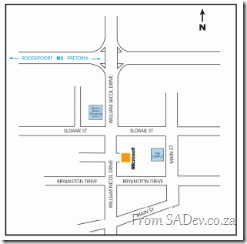 Finally, if you have a user group maybe you should think of joining us at community night? Free venue, projectors, seating, food & drink. Plus plenty of people attend, could be a great way to grow your group. I would personally love to see some Linux & PHP groups there because it would allow those who have not had a chance to see the non-Microsoft world an opportunity and hopefully learn that it isn’t so cut & dry out there.
Finally, if you have a user group maybe you should think of joining us at community night? Free venue, projectors, seating, food & drink. Plus plenty of people attend, could be a great way to grow your group. I would personally love to see some Linux & PHP groups there because it would allow those who have not had a chance to see the non-Microsoft world an opportunity and hopefully learn that it isn’t so cut & dry out there.
Remember, tomorrow 12th April 2011 @ Microsoft (map to the left) from first sessions kick off at 16:30 and second sessions get started between 17:30 & 18:00!
DevDays - The event for Microsoft Developers
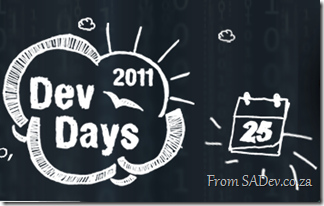 It’s that time of year again, it is DevDays time again which is the premier conference from Microsoft for developers! This year it is a very different beast from previous years:
It’s that time of year again, it is DevDays time again which is the premier conference from Microsoft for developers! This year it is a very different beast from previous years:
- Cost: For the second year, you’ll need to pay. This year it is R350 and that is excellent value for the event.
- Cape Town first: It kicks off in Cape Town this year on May 24th and then moves to Johannesburg after that on may 26th!
- Johannesburg new venue: We are at Gallagher Estate this year! Very excited about the venue!
- No Durban

- Hash tag from day one! See complaining to Cliff on Twitter does work so now we can all hash with #DevDaysSA!
- No SharePoint – I can’t remember a DevDays without SharePoint, but we have so many other awesome SharePoint options now (Information Worker, SharePoint Saturdays etc…) it is good to have some balance.
There is three tracks so you may want to brush up on how to pick good sessions (short answer, mine ![]() ) plus their is special slots for student & community sessions which really excites me to see new presenters getting big stage time!
) plus their is special slots for student & community sessions which really excites me to see new presenters getting big stage time!
I am also very glad that BBD Software (previously known as BB&D) is a major sponsor this year!
You can signup, get more details and engage on the official site at: http://www.microsoft.com/southafrica/devdays/
Agenda:
- End-to-end software testing with Team Foundation Server and Visual Studio
- Level: 200
Speakers: Ahmed Salijee & Colin Dembovsky
Visual Studio 2010 offers a wide range of software testing capabilities: manual testing, automated UI testing, database testing, low-level unit testing and even performance testing tools capable of simulating thousands of active users. It also provides support for test case management, defect tracking as well as configuring and running your tests in virtual and physical environments. But how do you know which tools to choose for your project? This session will, via a demo scenario, walk you through the various testing capabilities to assist you with the most effective use of Visual Studio 2010's testing capabilities. This session will be useful to developers as well as various tester roles including functional, performance and automation.
- Level: 200
- An end-to-end experience of Windows Phone 7 development
- Level: 200
Speaker: Rudi Grobler
An end-to-end walk through for developing Windows Phone 7 applications using Silverlight
- Level: 200
- Blend: Wiring it all together
- Level: 400
Speaker: Shane Morris
- Level: 400
- A lap around Internet Explorer 9 for web developers
- Level: 200
Speaker: Simon Wilkinson
Internet Explorer 9 adds new support for HTML5, CSS3 and many other new web standards, and this is the place to find out all about them. Not only will we learn about those, but we'll take a dive into the work the engineering team has done to make the browser faster through it's new JavaScript engine, the work they've done to ensure that the same mark-up works across all browsers and how hardware acceleration will make your site run faster, without any changes to your code!
- Level: 200
- Azure: Development from scratch
- Level: 200
Speaker: Gareth Jane
The Windows Azure platform is a flexible cloud-computing platform which allows developers to rapidly create highly scalable software applications. This session will introduce developers to the various services and components of the Windows Azure Platform. We will create a very simple application on this platform, especially focusing on the areas which distinguish development on Azure from traditional application development
- Level: 200
- ASP.NET web development with MVC
- Level: 400
Speaker: Brent Samodien
Join us in this session and discover the new features in ASP.NET MVC3 and what scenarios you can target with it. Learn more about the improved HTML Helpers and the new updates to Controller/Action/Method that make your code cleaner. Also, explore the richer URL routing and URL route mapping. We will also show how you can use alternative View Engines, including Razor.
- Level: 400
- A website's life: From sketch to publishing
- Level: 200
Speaker: Simon Wilkinson
WebMatrix is a new, free, fully featured, easy to install web development tool that helps you build ASP.NET and PHP websites and perform validation, SEO optimization and one-click publishing. My favourite feature however is a new script syntax for ASP.NET called Razor, which will help you create dynamic websites incredibly easily. We will spend some time sketching/wireframing our website, doing visual design work in Expression Design and then experiencing the rich development toolset in WebMatrix.
- Level: 200
- Let's get ready for the cloud: Building your applications so they
are cloud ready- Level: 400
Speaker: Robert MacLean
In a world where you hear people talking about the cloud, here are some guidelines on how to start building and structuring applications that will be easy to migrate to the Azure platform.
- Level: 400
- Code First in entity framework
- Level: 200
Speaker: Brent Samodien
Code First has been a great success with customers, and in this talk, we'll take a deep dive into how it works and talk about its upcoming RTM (Q1 2011). You'll see how Code First uses convention over configuration to improve developer productivity. Its flexibility allows for either automatic database provisioning or the ability to work with an existing database. We'll be demoing features beyond the initial RTM, such as Migrations support, and we'll also talk about the roadmap for Code First going forward
- Level: 200
- Silverlight 5: The Future
- Level: 200
Speaker: Shane Morris
- Level: 200
- Exploring Windows Azure storage
- Level: 400
Speaker: Gary Hope
Examine each of the foundation storage capabilities of Windows Azure, Blobs, Tables and Queues. Discover how to create storage accounts; upload and retrieve blobs and blob metadata; create, update and query tables; and create a simple service that uses a message queue for communication
- Level: 400
- LightSwitch basics: Building your first LightSwitch application
- Level: 200
Speaker: Robert MacLean
Visual Studio LightSwitch is the simplest way to build business applications for the desktop and cloud. LightSwitch simplifies the development process by letting you concentrate on the business logic, while LightSwitch handles the common tasks for you. In this demo-heavy session, you will see, end to end, how to build and deploy a data-centric business application using LightSwitch. After that you will discover what is under the hood to better understand the architecture of a LightSwitch application. Finally you will learn how you can use Visual Studio 2010 Professional and Expression Blend 4 to customize and extend its UI and Data layers for when the application's requirements grow beyond what is supported by default
- Level: 200
- Kung Fu Silverlight: Tips and architectural patterns and practices
- Level: 400
Speaker: Dave Russell
Learn about the rewards of using RIA Services together with development patterns, such as the Service Providers, Single Responsibility pattern, Commanding, user Interactions, Messaging, ChildWindows, Design Time Data, Testing, and developing using Model-View/View- Model (MVVM) pattern, to build Silverlight and Windows Phone apps. Hear the top tips you need to know for building data driven Silverlight apps that solve real world problems.
- Level: 400
Presentation Dump: End of 2010
Previous presentation dumps:
All slides can be found at: http://www.slideshare.net/rmaclean
This is the smallest presentation dump so far, mostly because a lot of the work I did in the second half of 2010 was at public events, like Tech-Ed, and those have already been upload. One of the big pushes I did in the last part of the year was around design of the presentation and I think the T4 presentation is a highlight of that work for me.
T4 Templates
OData
Developing RESTful Services in .NET
Workflow Foundation 4
CommNight December - Some interesting events
 In the middle of the company parties, you should take one night off to do some fantastic learning and networking at CommNight (Community Night) on the 14th December! You can read about all the details on the Microsoft DPE Blog.
In the middle of the company parties, you should take one night off to do some fantastic learning and networking at CommNight (Community Night) on the 14th December! You can read about all the details on the Microsoft DPE Blog.
There are two groups which I want to highlight which will be at CommNight:
S.A. Developer
S.A. Developer is a user group for developers and in December will be hosting the following topics:
- Tool of the month: This short (10min to 15min) session is where someone can present their favourite developer focus tool or add-on.
- Unit Testing WPF & Silverlight – Tools & Techniques: Silverlight and WPF can be used to create truly immersive UI experiences for users. Testing these UI components and the logic around it can become complex – especially when using frameworks like PRISM. Join us in this session as we take a look at a few tools and techniques that can be used when unit testing WPF and Silverlight applications.
Really looking forward to this session!
Information Worker
Information Worker is a user group for those in the IW space, not just developers but everyone even people who job just involves Excel and Outlook! This month we are looking at:
- Lync – Microsoft’s Unified Communication System
- Windows Phone 7 – What does this give the IW user? Things like Office and SharePoint integration will be discussed
T4 Cheat sheets!
I’ve been spending a lot of time working on two things recently: T4 (Text Template Transformation Toolkit) and Windows Phone 7. Part of my work around T4 included creating some cheat sheets to make it easier to get to grips with it!
There is now three posters available (High res PDF’s below or on the DRP site):
General Overview
This provides a high level overview of the various components in T4.
@template detail
The @template directive has a lot of options and this sheet provides detail on those.
Examples
This sheet provides usage examples of various aspects directives in T4.
You can see my time with Windows Phone 7 leaking into these two as I loosely designed them around the Metro UI design guideline that Windows Phone 7 uses. Interestingly for me is that Metro seems to work fantastically well for cheat sheets as these are some of the nicest and easiest to grok sheets I’ve ever done.
Tech·Ed Africa 2010 - Slides, scripts and demos for my talks
Tech·Ed Africa 2010 ended on Wednesday and it was a great event. Thanks to everyone who came to my sessions and came up to me after and between sessions to chat. I felt very honoured to be able to meet and share with you :D
This post is for those who want the slides or demo information. I have completed versions of the demos below (in the zip file) and the script for each demo which gives you the step by step process I used (in the docx file).
APS302 – Intro to Workflow Services and Windows Server AppFabric
Other content for this session:
APS309 – Windows Server AppFabric Caching What it is and When you should use it
Other content for this session:
APS310 – WCF Made Easy with .NET 4 and Windows Server AppFabric
Other content for this session:
Have you got the right stuff?
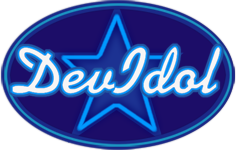 Tech·Ed Africa is a few weeks away and Microsoft have announced an amazing event which will run at the event – Dev Idol!
Tech·Ed Africa is a few weeks away and Microsoft have announced an amazing event which will run at the event – Dev Idol!
It is really easy, you go to Tech·Ed and at a specified time you get up and present a short presentation of your choosing – and if it is the best you win, and you win BIG!
The prize for the winner is a speaker slot at Tech·Ed Africa 2011 (this is a big deal trust me) and an XBox 360! Two runner ups get free entry to Tech·Ed Africa 2011.
Before you throw your hands up and say, “What’s the point?! Tech·Ed Africa 2010 already has great presenters who will easily win it!”, well current presenters are not allowed to enter, this is only open to attendees! However you have to hurry as you only have until the 13th October to get your entries in.
Get all the details you will need at http://blogs.msdn.com/b/southafrica/archive/2010/09/29/dev-idol-comes-to-tech-183-ed.aspx
Tech·Ed Africa - How to find the gems in the sessions?
 Tech·Ed is around the corner and if you have seen the session catalogue, you will see there is
Tech·Ed is around the corner and if you have seen the session catalogue, you will see there is 267 295 sessions available for you to attend! How are you supposed to know what sessions are quality that you should attend?
Disclaimer: Rights Management Server is a great product for certain situations and I am picking on it in this post as an example more than anything else.
Know Yourself
The first thing to get right is to know yourself – if you have just started writing C# code, attending an advanced session on the internal workings of LINQ may be a waste of time as you may not be able to keep up to speed.
Knowing yourself is not just about knowing your skill level, but also knowing what is important to you – if you have no plans on using Rights Management Server (RMS) don’t attend the sessions on it, because you will miss out on other great sessions that may bring you a value, however this does not mean you should only attend sessions for technology you know and work on.
Identify Trends
 Part of the benefit of the conference is exposure to items which you may not get the time to see during your normal day, so you may be tempted to go to that RMS session because you do not know about it but my suggestion to this is that when you are looking for sessions on topics you do not know about, you should look at where the hot trends are (they aren’t in RMS). A great way to see what the hot trends are is to to look at what community and knowledge sharing sites, like Channel 9, is talking about.
Part of the benefit of the conference is exposure to items which you may not get the time to see during your normal day, so you may be tempted to go to that RMS session because you do not know about it but my suggestion to this is that when you are looking for sessions on topics you do not know about, you should look at where the hot trends are (they aren’t in RMS). A great way to see what the hot trends are is to to look at what community and knowledge sharing sites, like Channel 9, is talking about.
The reason I suggest new trends over other items is this that the new trends is where the cutting edge technology and learning is and so there is often not a lot of content available on that topic, compared to say RMS where it is well documented and training is easy to get hold of.
Decoding Sessions
Every session at Tech·Ed has a code, and this code has some key information that will mean you get to the right sessions easily. If I look at one of the sessions I am presenting, the code associated is APS309, but what does that mean?
- APS – This is the track, or the high level concept that the session is part of. APS in this case refers to Application Server. Microsoft has a great guide to all these TLA (three letter acronyms) on the technical track page. The only item missing from there is WTB, which stands for Whiteboard which I will cover next.
- 3 – This digit is key, it identifies the level of the session and is between 1 and 4.
- 1 indicates a introduction session - where you can come in with zero knowledge on the topic. Expect it not to be deep, expect the pace to be slow and expect it to cover the concepts.
- 2 indicates a beginner session - you should’ve seen something on it before arriving. Expect it to cover usage scenarios and the pace and depth to be increased.
- 3 indicates a technical session – you should be working with the technology. These often go fast and deep or explore a new area in that space.
- 4 indicates a deep dive – you should expect a session that is for the most advanced of people.
- 09 – This is a unique identifier.
The next thing about understanding is to read the abstract for the topic, this is the overall plan for the session. So if we take my session again, the title is: Intro to Workflow Services and Windows Server AppFabric however if you read the abstract you will note that it mentions Workflow Foundation (WF) first and talks about developers using it. Then it mentions WF and usage with Windows Communication Foundation (WCF) and how they integrate in .NET 4. Finally it mentions AppFabric and hosting.
This tells you a lot of my plan for the session, I am going to talk to developers first about WF and then WCF. Finally I will bring in more technical topic of hosting these in AppFabric. This does not come across in the title, which is why the abstract is important to read and read carefully.
Session Types
There are two types of sessions breakouts and whiteboards. A breakout is a formal presentation where normally one person presents a topic with demo’s. A whiteboard is far less formal and often includes panel discussions – here you will find the topics often change based on the questions and discussions with the audience.
I have personally found when I need to learn a technology I head to a break out, but if I know the topic then the whiteboards give senior developers much better value.
Networking
Tech·Ed is first about getting a few thousand passionate people together which means you have the option to network with experts and make great contacts. Most presenters will take time for questions, but if not, most will welcome you coming up to them afterwards.
In addition to this there is also two special options for networking:
- Community Lounge – Community leaders are some of the smarted and most passionate people I know and the community lounge provides a great place to relax and talk to them.
- Ask the Experts – This is a special event where experts make themselves specially available to take questions and have one on one (and sometimes one on many) discussions. This is a great chance to get contacts so that when you run into a problem you have a lifeline.
Get Started Now
Don’t wait until you arrive at Tech·Ed to start thinking about sessions, start thinking now about the sessions you want to go to and digging into what trends and speakers you should be finding.
A great tip for corporates is something we at BBD do each year for the 30 or so people we send – a pre event get together. Here the people who have been before share some guidance and what to expect about the event with those who have never been and we all talk about the sessions and speakers we are excited about to help those who do not have the time to do deep research find some gems.
Lastly, for those who tweet, start following the Twitter conversation for the event! There is an official account @teched_africa and an officially long hashtag #TechEdAfrica. To really impress people you can combine them both into a single Twitter Search @TechEdAfrica OR #TechEdAfrica!
Update 8 Oct 2010: I presented a short session based on this post to the staff at BB&D which you can find below:
Come and hang out with me at Tech·Ed Africa 2010!
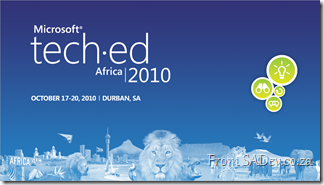 Tech·Ed Africa 2010 is less than a month away and it is a massive conference where all things IT Pro and developer are discussed. It is a great conference, filled with networking (read: beer), wonderful sessions and great prizes!
Tech·Ed Africa 2010 is less than a month away and it is a massive conference where all things IT Pro and developer are discussed. It is a great conference, filled with networking (read: beer), wonderful sessions and great prizes!
I will be attending as a speaker again this year so I thought I would share what I will be talking about, however before I get to that I want to talk about a wonderful prize I am giving away.
Certain MVP’s got given some Visual Studio 2010 Ultimate licenses to give away, and I was lucky enough to get three of those. Each license is values at $11600!! I will be giving these away at the community lounge as part of a fun game! Details of the game will be available at the lounge at the event.
Back to my shameless promotion ![]() Tech·Ed has two types of sessions Breakout Sessions where I get up on stage and present and demo for about an hour and Whiteboard Sessions which are interactive discussion sessions. I am lucky to have a few of each. Note: this is all subject to change.
Tech·Ed has two types of sessions Breakout Sessions where I get up on stage and present and demo for about an hour and Whiteboard Sessions which are interactive discussion sessions. I am lucky to have a few of each. Note: this is all subject to change.
Breakout Sessions
Intro to Workflow Services and Windows Server AppFabric
Windows Workflow Foundation 4 (WF4) provides a flexible, declarative programming model and a brand new runtime architecture that makes it easily accessible for .NET developers. What that means for developers is that WF4 can make it easier to put together your application logic, encapsulate complex control flow logic, and abstract complex programming tasks. WF4 also composes nicely with Windows Communication Foundation (WCF) for writing declarative workflow services that support content-based message correlation and long-running duplex conversations. When you combine the framework features with the new AppFabric capabilities in Windows Server to host and manage your workflows and services , you have a comprehensive workflow solution in Windows. In this session we will look at examples of how you can use WF4 in your application and service development to speed your development and simplify complex tasks, as well as how to build powerful, manageable workflow services with WF, WCF and AppFabric. Come find out how this powerful, testable framework can help you and your development team take programming to the next level.
WCF Made Easy with Microsoft .NET Framework 4 and Windows Server AppFabric
Windows Communication Foundation (WCF) is a flexible and powerful platform for building service-oriented applications, and with that flexibility comes some complexity. As of .NET Framework 4 – configuring, securing, hosting and managing WCF services has never been easier! WCF 4 and Windows Server AppFabric come together to help developers and IT administrators overcome the complexity. Come find out how much easier it is to configure WCF services in .NET 4 including alignment with the Microsoft ASP.NET configuration model and a reduced configuration footprint. Also learn Windows Server AppFabric features for the IT administrator, finally making it easier for IT administrators to easily access settings they care about such as security and throttling features; providing control over the hosting lifecycle of WCF services; and giving new visibility into faults, exceptions, and tracing and diagnostics features to help you manage your service deployments in production un-intrusively.
Windows Server AppFabric Caching: What It Is and When You Should Use It
The distributed in-memory caching capabilities of Windows Server AppFabric will change how you think about scaling your Microsoft .NET-connected applications. Come learn how the distributed nature of the cache allows large amounts of data to be stored in-memory for extremely fast access, how AppFabric’s integration with Microsoft ASP.NET makes it easy to add low-latency data caching across the Web farm, and discover the unique high availability features of AppFabric which will bring new degrees of scale to your data tier.
Whiteboard Sessions
Web Service Interop
This is a panel discussion on web service interop with myself, Nabeel Prior (Microsoft BizTalk Expert), Anton Delsink and Ryan Crawcour (BizTalk Expert from New Zealand).


